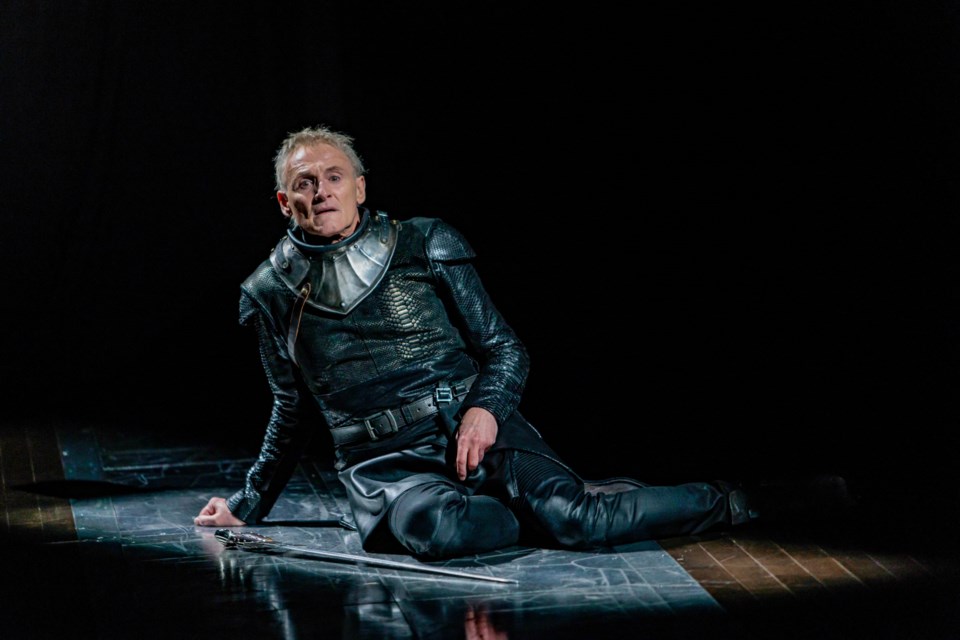As gruesome murders, assassinations and suicides mount with frightening speed, the onus was on veteran actor Colm Feore to prove Shakespeare’s arguably most horrifying creation lived with at least an ounce of humanity in his malformed body and troubled soul at Saturday’s premiere of Richard III at a magnificently reborn yet still intimate $72 million Tom Patterson Theatre.
With a badly-displaced spine affecting his ability to walk but thankfully no longer with the hunchback the Bard saddled him with for centuries, Richard is corrupt, sadistic and calculating. Yet Feore, with articulation and grace, finds that minutiae of human decency in Act 1, Scene 1:
Now is the winter of our discontent
Made glorious summer by this son of York;
And all the clouds that lour’d upon our house
In the deep bosom of the ocean buried.
Now are our brows bound with victorious wreaths,
Our bruised arms hung up for monuments,
Our stern alarums chang’d to merry meetings,
Our dreadful marches to delightful measures…
Traditionally audiences have seen Richard III as a murderous psychopath. Shakespeare’s literary text, often graphic in nature, chronically presents life-ending events, arguing that contention without many contradictory arguments ever surfacing.
Richard’s deviously cold and astutely well-calculated plot to wrest the throne from King Edward IV takes shape early as he pursues the widow Lady Anne (Jessica B. Hill), wooing her in the funeral procession of her father-in-law King Henry VI, a murder victim of Richard’s.
He imprisons his eldest brother Clarence in the Tower of London and is murdered by Richard’s hired assassin. With the king gravely ill, assisted by Lord Hastings and the Duke of Buckingham, respectively, portrayed in excellent fashion by Ben Carlson and André Sills, he is appointed to govern in his place.
Played with grand rigour and individual strength by Seana McKenna, Queen Margaret, the former queen of Henry VI, curses Richard and the kingdom. More murders take place in the Tower of London as Buckingham assists his rapid rise to power.
On brother Edward’s death, he becomes King Richard III and as expected the death toll mounts under his rule.
Heir to the Lancastrian claim, Henry Tudor, Earl of Richmond, mounts an army in France to oppose Richard's rapidly escalating tyranny. Prior to the forces’ clash at Bosworth in Leicestershire, Richard is haunted by the ghosts of his victims (Act 5, Scene 3). Another lengthy monologue ensues, parts of which reveal self-admitted guilt:
O, no. Alas, I rather hate myself
For hateful deeds committed by myself.
I am a villain. Yet I lie; I am not.
Fool, of thyself speak well. Fool, do not flatter.
My conscience hath a thousand several tongues,
And every tongue brings in a several tale,
And every tale condemns me for a villain.
If only momentarily after those hallucinatory visits from the avenge-seeking apparitions, Feore skillfully articulates the man’s complexity. The transformation does not last as Richmond kills Richard III on Bosworth Field.
So, do today’s audiences still see Richard III as simply a murderer/serial killer or is there enough substantive proof within Shakespeare’s text to support a modernistic view of him as a troubled man, possibly a control freak without borders, suffering from an overwhelming anxiety disorder?
Antoni Cimolino directs with purpose and a provocative thought-provoking vision of twisted power as the Plantagenet era came to an abrupt end. With Feore’s invigorating performance, a strong acting company and skilled technical staff, an exceedingly taut masterpiece is created.
Richard III continues until October 30.
